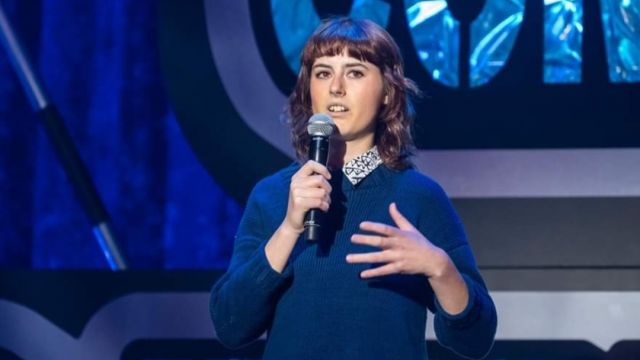A Chance to Address the Amish Rumours
Amish? Rumours of? But that reference to the fundamentalist Anabaptist Amish sect in this show’s catchy title is just a way to introduce the way Stephanie Hare grew up in the wilds of Tasmania without technology, without electricity - not even a fridge! The Amish eschew technology out of religious conviction. Hare’s Mum was not religious – she was, if anything, a Communist who moved into the wilderness and built a house out of conviction and – as Hare puts it – firewood. We see a wide shot picture of this house on a big screen, but there’s just the one picture. The rest we must imagine as Hare describes how Mum added rooms as time went by – and as more children arrived. Dad, meanwhile, was a sort of a Catholic, although not an attending-church-Catholic, preferring to sojourn periodically in a cave even deeper into the wilderness – although returning often enough to procreate...
It is these autobiographical details that hold our attention in this show – rather than the stand-up style jokes. These details are fascinating, and we’d like to hear more, but Hare prefers to state them in an abrupt matter-of-fact way with a flicker of irritation at us not getting it. When Hare finally gets curious enough to visit her religious Dad’s cave, expecting a sort of ascetic hermit’s hang out, the reality is not at all what was expected... But having revealed that much in this already truncated narrative, that’s all we’re going to get. Hare doesn’t develop the bare facts into a narrative – and it’s frustrating because we feel, we expect, that she could. What about Mum? There was a school, apparently, but where was it? And if there was school, no social media at all? Was there a vehicle of some sort?
But eventually, inevitably, there’s a major change in this story. Well, several. Hare leaves the wilds of Tasmania, lives in houses with fridges, strangers and suffers the culture shock of the ‘mainland’ and then... Scotland. Why Scotland? Well, why not? Hare has always liked girls and it’s in Scotland that Hare learns there’s a word for that – ‘lesbian’. So, there is a word for it. Although – an interesting claim – now there’s a boyfriend – ‘like all lesbians’... The first steps into comedy come from watching other comedians and thinking, ‘I could do better than that...’
That frustration I mentioned earlier becomes exhausting by the end because we’re pulling for Hare, wanting more, sensing so much potential comic talent that feels undercooked or even repressed under the diffident, self-effacing delivery. At Hare’s best, there’s a deadpan, dry delivery, but when there is a punchline, it’s mumbled or swallowed. There’s no oomph, no connection. Still, the talent, or the potential, has been recognised and praised elsewhere. And it’s early days yet.
Michael Brindley
Subscribe to our E-Newsletter, buy our latest print edition or find a Performing Arts book at Book Nook.

